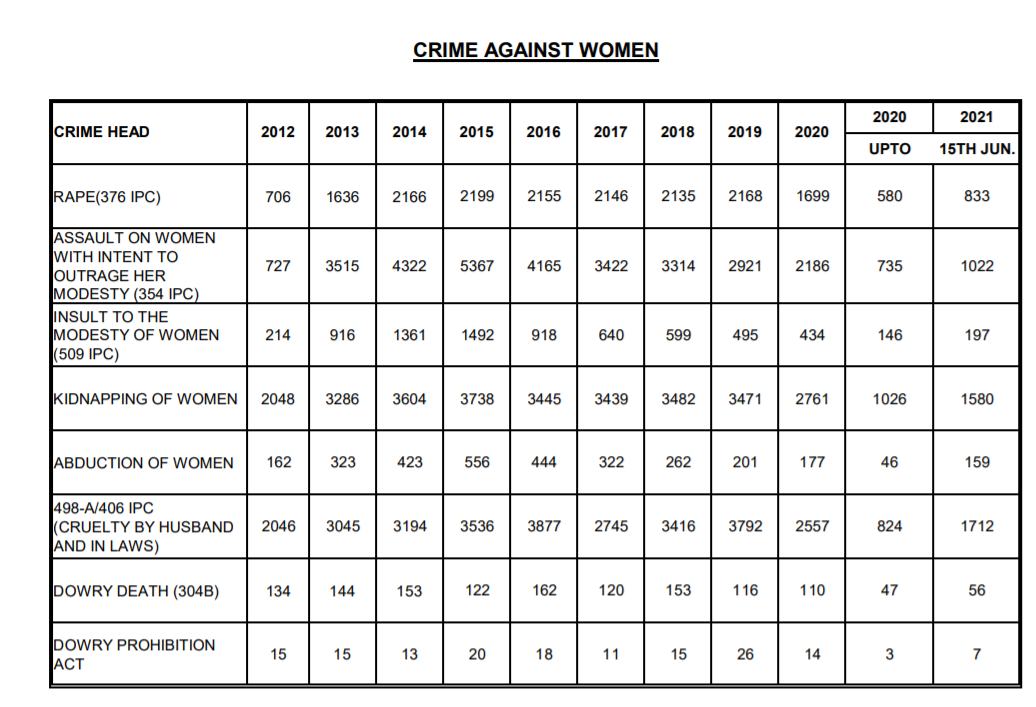
Crimes against women have surged across the country. Even the national capital is not safe for females, writes MADIHA RAZA
Crimes against women have shown an upward trend in the national capital and in particular and in the country in general. During the first six months of year 2021 up to June, national capital witnessed whopping 833 rape cases this year as against 580 in same period in the previous year 2020. The trend is similar, though not as alarming in the country as a whole.
Figures released by the Delhi Police reveal that the crimes against women in the Capital increased by 63.3 per cent in the first six months of 2021 as compared to 2020.
The data states that rape cases saw an increase of 43% from 580 till June 15 last year to 833 this year, molestation jumped by 39% from 733 to 1,022, kidnapping of women from 1,026 to 1,580, abduction of women from 46 to 159, and dowry deaths from 47 to 56.
As if the trend was country-wide, the data from the National Commission for Women reveals that 1,463 complaints of domestic violence against women were received from January, 2021 to March 25, 2021 and the trend continues. The NCW received a total of 19,730 complaints of crimes against women in 2019 as compared to 23,722 in 2020. Sources said that trend continued even as it entered 2021. A year after the lockdown, the NCW continues to receive over 2,000 complaints every month of crimes against women with nearly one-fourth of them related to domestic violence, it stated.
The nationwide lockdown was imposed on March 25 last year to curb the spread of the Covid-19 pandemic, but it also trapped many domestic violence victims with their abusers. Soon after the lockdown was imposed, the NCW reported a surge of complaints related to domestic violence so much so that it started a dedicated WhatsApp number for reporting of just domestic violence complaints. The number of complaints of domestic violence went on increasing through the months and in July, a record number of 660 such complaints were received.
Since June, the NCW has been receiving over 2,000 complaints of crimes against women every month out of which nearly a quarter are of domestic violence, the data stated.
According to the NCW data, 25,886 complaints of crimes against women have been received from April, 2020 till now which includes 5,865 complaints of domestic violence. Also, the NCW received the highest number of complaints against women in six years in 2020 at 23,722 with nearly one-fourth of them of domestic violence.
NCW chairperson Rekha Sharma had said economic insecurity, increased stress levels, anxiety, financial worry, and lack of other such emotional support of parents/family’s side may have resulted in domestic violence in many instances. She quipped “Home has become the workplace of both the spouses and as well as schools and colleges for their children. In such situations, women are multitasking being professional at the same time supporting their families from the same space. But the biggest challenge for women this year is not only to adapt, but to thrive in this unprecedented situation.”
 Source:Delhi Police
Source:Delhi Police
Sadly, in the national capital, heinous crime figure, till June 15, has come down marginally from 2,436 to 2,315. In the first six months this year, the city recorded seven cases of dacoity, 196 murder, 295 attempt to murder, 942 robbery, 35 riot cases, and seven kidnapping for ransom. According to the police data, in the corresponding period last year, Delhi witnessed four cases of dacoity, 226 murders, 236 attempt to murder, 701 robbery, 681 riot cases and eight kidnapping for ransom.
According to the data, the number of non-heinous crimes has increased by 8.5%. Till June 15 this year, a total of 1,20,980 cases of non-heinous crime have been reported while the number stood at 1,11,419 last year. The data showed there were 1,217 more cases of snatching reported in 2021 as compared to 2021 with 3,829 cases of snatching this time and 2,612 in last year. The total number of cases of hurt, burglary, motor vehicle theft and house theft stood at 493, 1,173, 15,667 and 938 respectively as compared to 421, 839, 13130, and 875 last year. The data showed that fatal and non-fatal accidents rose from 392 and 1,260 cases in 2020 to 449 and 1,497 cases this year, respectively.
The number of complaints of domestic violence received by the National Commission for Women rose sharply from 2,960 in 2019 to 5,297 in 2020, the year of the lockdown when most people were confined to their homes due to Covid-19. The trend continues this year as well.In the meanwhile, the number of child sexual abuse cases reported from March 2020 onwards on various platforms as reported by the National Crime Records Bureau (NCRB), the total number of child pornography/rape and gang rape complaints lodged in the National Cybercrime Reporting Portal (NCRP) from March 1, 2020 to September 2020 was 13244. As reported by the National Commission for Protection of Child Rights (NCPCR), information of 420 cases of child sexual abuse has been received by NCPCR from 1st March, 2020 till 31st August, 2020 via online portals, helplines and other media. As reported by Childline India Foundation (CIF), 3941 calls have been received by CIF regarding child sexual cases from 1st March, 2020 to 15th September,2020.
A written statement in Parliament claimed that the Central Government has taken several measures to fast track investigations in cases of child sexual abuse. These steps include mechanism for online reporting of child sex abuse cases, accessibility of reported incidents to concerned Law Enforcement Agencies (LEAs), improving cyber forensic facilities, training of Law Enforcement Officers/Judges/ Public Prosecutors, spreading awareness etc. The Government implements a scheme for setting up of 1023 Fast Track Special Courts (FTSCs) for expeditious trial and disposal of different cases related to rape and POCSO Act. As on August 26, 2020 there are 597 FTSCs functional out of which 321 are exclusive POCSO courts.
National Commission for Protection of Child Rights (NCPCR) and State Commission for Protection of Child Rights (SCPCRs), who are mandated to monitor the implementation of the POCSO Act, have developed and circulated information, education and communication (IEC) material on POCSO Act.
How these steps help in improving the lot of women and check crime against women is a million dollar question. From time to time, the governments have been claiming to check this menace, but earnest moves would actually work say women activists and make the country a safe place for women and girl child.
tehelkaletters@gmail.com












